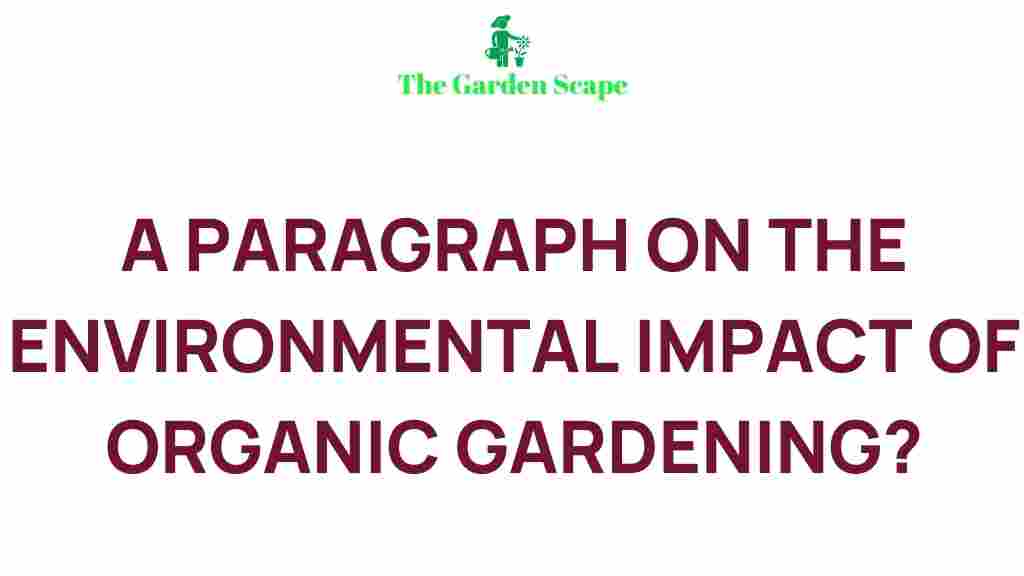Organic gardening is more than just a trend—it’s a lifestyle that promotes sustainability, improves soil health, and encourages biodiversity. In this article, we’ll dive into the hidden benefits of organic gardening and show you how adopting this practice can transform your gardening experience and contribute to a greener planet.
What is Organic Gardening?
At its core, organic gardening is the practice of growing plants, fruits, vegetables, and herbs without synthetic fertilizers, pesticides, or genetically modified organisms (GMOs). Instead, organic gardeners rely on natural methods to nurture their plants, such as composting, crop rotation, and biological pest control.
The Hidden Benefits of Organic Gardening
1. Enhancing Soil Health
One of the most significant benefits of organic gardening is its ability to improve soil health. By avoiding chemical fertilizers and focusing on natural amendments like compost and manure, you can create nutrient-rich soil that supports plant growth and retains moisture.
Over time, healthy soil becomes a self-sustaining ecosystem, reducing the need for additional inputs and creating a foundation for productive gardens.
2. Protecting Local Ecosystems
Organic gardening encourages biodiversity by avoiding harmful pesticides that can disrupt local ecosystems. Beneficial insects, such as bees and ladybugs, thrive in organic gardens, contributing to pollination and natural pest control.
This sustainable approach also protects nearby water sources from chemical runoff, promoting a cleaner environment.
3. Growing Nutrient-Rich Produce
Organically grown fruits and vegetables often have higher levels of vitamins and minerals compared to conventionally grown produce. Without synthetic chemicals, plants focus on natural growth, resulting in crops that are not only healthier but also more flavorful.
Learn how to grow your own organic vegetables by exploring our step-by-step guide to sustainable gardening.
4. Reducing Carbon Footprint
Organic gardening can significantly lower your carbon footprint. By reducing the use of synthetic fertilizers (which are energy-intensive to produce) and focusing on locally sourced inputs, you minimize the environmental impact of your gardening activities.
Additionally, composting organic waste reduces methane emissions from landfills, contributing to a greener planet.
5. Fostering Mental and Physical Health
Gardening is a therapeutic activity that reduces stress, improves mental clarity, and provides a form of exercise. Organic gardening takes this a step further by connecting you with nature, allowing you to work with the soil, and enjoying the rewards of fresh, chemical-free produce.
Getting Started with Organic Gardening
Step 1: Choose the Right Location
Select a sunny location for your garden, as most vegetables and flowers thrive with at least six hours of sunlight daily. Ensure the area has good drainage and is easily accessible for watering and maintenance.
Step 2: Prepare the Soil
Healthy soil is the foundation of a successful organic garden. Start by testing your soil’s pH and nutrient levels to determine what amendments it may need. Work in organic compost or well-rotted manure to enrich the soil with nutrients.
Step 3: Select Organic Seeds and Plants
Purchase certified organic seeds and plants to ensure they are free from synthetic treatments and GMOs. Look for varieties suited to your local climate and growing conditions.
Step 4: Implement Natural Pest Control
Rather than using chemical pesticides, focus on natural pest control methods, such as:
- Attracting beneficial insects, like ladybugs and lacewings
- Using physical barriers, like row covers or netting
- Applying natural remedies, such as neem oil or garlic spray
Step 5: Practice Crop Rotation
Rotating your crops each season prevents soil depletion and reduces the risk of pests and diseases. For example, follow nitrogen-heavy crops like corn with legumes that enrich the soil with nitrogen.
Troubleshooting Common Challenges in Organic Gardening
Dealing with Weeds
Weeds can compete with your plants for nutrients and water. Use mulch to suppress weed growth and hand-pull weeds as soon as they appear to keep your garden tidy.
Managing Pests
If pests become a significant problem, consider introducing beneficial insects or using organic sprays. Regularly inspect your plants for signs of damage and take action early to prevent infestations.
Improving Soil Quality
If your plants aren’t thriving, your soil may need more organic matter or specific nutrients. Regularly test your soil and amend it with compost, bone meal, or other natural fertilizers as needed.
Conclusion
Organic gardening offers countless benefits, from improving soil health and producing nutrient-rich crops to protecting the environment and enhancing your well-being. By adopting this sustainable approach, you not only grow healthier plants but also contribute to a healthier planet.
Ready to get started? Explore our complete organic gardening toolkit or visit Organic Gardening for more resources and inspiration.
Embrace the art of organic gardening and experience the hidden benefits for yourself!
This article is in the category Garden Design and created by TheGardenScape Team
